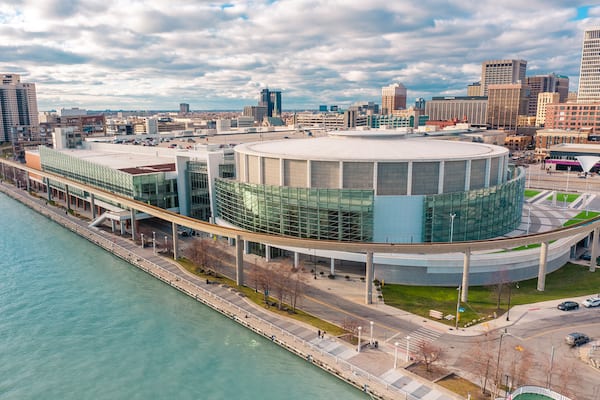Recent reforms to work rules have created a surge of both contractor and customer satisfaction with electrical services in Chicago’s McCormick Place convention facility.

The changes allow show organizers the freedom to choose their electrical service providers from a list of pre-qualified contractors approved by the Metropolitan Pier and Exposition Authority (MPEA), the owners of McCormick Place. The approved supplier can serve in multiple capacities, including but not limited to general contracting, electrical and plumbing.
Currently, the MPEA list consists of three national contractors: Global Experience Specialists (GES), Freemanco, and specialized utility contractor, Edlen Electrical Exhibition Services.
The MPEA has employed new obligations on the part of the contractors in order to pre-qualify them for use as service providers at McCormick Place. According to David Causton, MPEA general manager, by signing a “right of entry”, the general contractors are agreeing to the work rules and the changes that were implemented by the legislation.
“As long as they are working with a bonafide electrical contractor that’s signatory with the International Brotherhood of Electrical Workers here in Chicago and they have the technical capabilities to provide all electrical services, general contractors can register and sign with us to provide those service to our customers,” said Causton.
The general contractors must also provide the MPEA with their insurance coverage and all of the items necessary to conduct business. Only then are they demonstrating the fact that they have the competency to provide electrical services at McCormick Place.
“It’s a new day at McCormick Place since exhibitors can now operate in a more hassle-free environment than they worked in before,” said Causton. “Exhibitors have the freedom of choice to decide if they want to do things themselves and are doing things more efficiently, quicker and at a lower expense. As we start to come out of the economic situation our industry has found itself in, we’re seeing shows performing better than they did before.”
As part of the work rule changes, the MPEA’s in-house electrical services provider, Exhibitor & Technical Service (ETS), now offers at-cost services, while the other contractors must negotiate for business.
Causton said it promotes an increased competition in the marketplace. He also said forcing competition provides the lowest price to the exhibitor, creating a check and balance for each company to supply the very best customer service they can. The key to all of this is that electrical service decisions now rest with the show organizer and not with the facility.
“When GES, Freeman or Edlen come to us and use our electricians, by law, we sell those electricians to them at-cost,” said Causton. “What they end up charging for their labor rate or their services is determined through a negotiation that the show organizer has with each individual company. So they can take pricing from all three of the companies, make a determination of who provides the best price and then determine who they give their business to.”
As a direct result of this free market system, organizers can use one company for general contracting and another for electrical services. Other times, they are using the same contractor for all services as a one-stop-shop experience. Either way, organizers are finding an upgrade in customer service and a downgrade in expense as a consequence of the new arrangement in Chicago, and the modified rules have associations positively charged up.
The American Meat Institute (AMI) 2011, a premier show held at McCormick place after the legislation was enacted, had significant price reduction with an overall average savings of about 20 percent for their exhibitors. Show organizers also received nothing but positive feedback and improved customer service.
“Keep in mind we were the first show to occur after the final stages of all of the changes that occurred,” said Anne Halal, AMI vice president. “Prior to 2011, our exhibitors’ largest complaint was the high price, inefficient labor and poor customer service.”
Show organizers for AMI opted to use GES as its general contractor and electrical service provider for last year’s Spring show.
“The simplicity of having one provider install electrical and have the inside knowledge of when carpet and how much equipment is coming to that booth saved our exhibitors a lot of headaches,” said Halal. “In many cases, the high costs occur when the orders are not coordinated and the equipment is delivered before the electric service is laid down. Or the carpet is ordered, but the electric is put in the wrong location. In 2011, I did not receive one single complaint regarding electrical-related services.”
General contractor, ESP, and longtime partner with the Chicago convention industry, GES, agree that the reforms have benefitted all involved and are empowered by the opportunity to participate in customer contract negotiations.
“GES has operated in an open and competitive marketplace at McCormick Place and Navy Pier both as an official service provider and as an exhibitor appointed contractor before the ‘labor legislation’,” said John Patronski, GES executive vice president of industry development. “However, GES is now allowed to provide utility services as part of our overall service and product offerings at McCormick Place and Navy Pier.”
According to Patronski, the reforms have proven to be in everyone’s best interests. Exhibitors report a better experience at McCormick Place, and the labor force has more work.
“The show organizers requested these facilities eliminate the ‘exclusivity’ and become ‘open facilities’, allowing for the show organizer to select an approved utility service provider of their choice,” said Patronski. “The selection process and evaluation is at the discretion of the show organizer, but the key issues that we have been asked to address are capabilities, service improvements and to be competitive in the market place.”
GES also believes these developments have sent a message to show organizers and exhibitors that Chicago is ready to recapture its status as a premier business exhibition and event destination.
Edlen also believes conditions are improving since the implementation of the work reform rules, and since they are a specialized provider, they feel they are in a strong position to compete with Freeman and GES for any sized event.
“The in-house provider at McCormick provides labor for utility services, but the competition for electrical services is among outside contractors,” said Jim Wetterling, Edlen president. “Outside contractors and the competitive atmosphere have promoted better client service.”
These customer-requested changes moved the MPEA to respond in a big way, including the way they have given customer service first priority over profit. Focus One, the former electrical service provider at McCormick Place, historically produced some of the highest profit margins at convention center. But since ETS must not provide its services at cost, the money needs to be gleaned elsewhere.
“The Authority will expand the Hyatt Regency McCormick Place hotel and add another 400 rooms, so at the end of the project, it will be a 1,200-room property,” said Causton. “Ultimately, that is where the additional revenue will be generated: from the hotel and not the ongoing operations at the convention center.”
The new collaboration between the MPEA, Local 134 of the IBEW and the pre-qualified electrical service providers has also seemed to galvanized the industry.
“There has been a sea change, not just in lowering costs and not just in providing opportunities for exhibitors to do more work for themselves, but in the whole attitude of representative labor on the show floor,” said Causton. “And the survey results we get from our customers, since we were able to negotiate the final resolution to the issues, have been smooth sailing as it relates to the operation of the facility.”





























